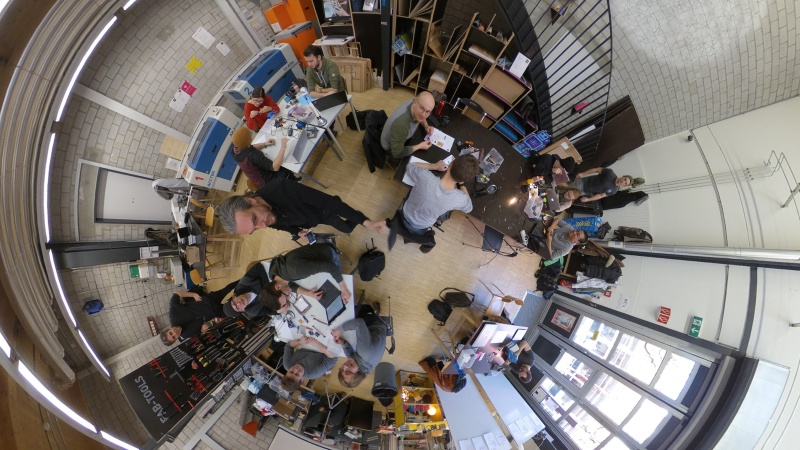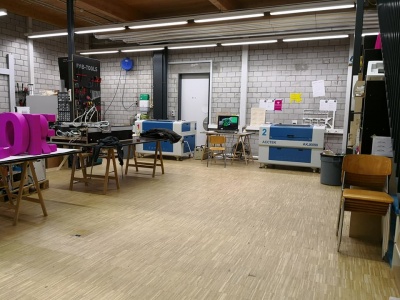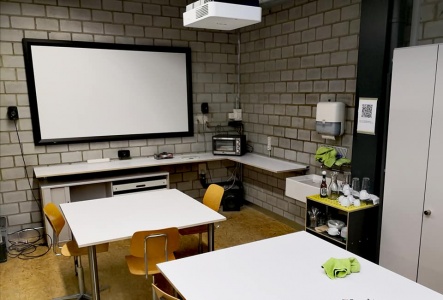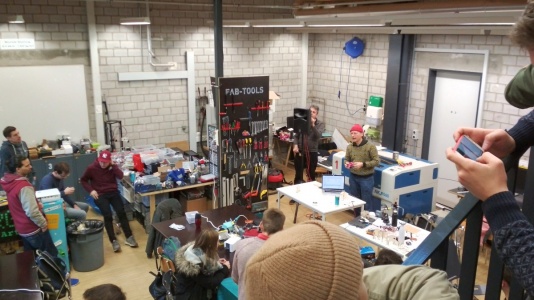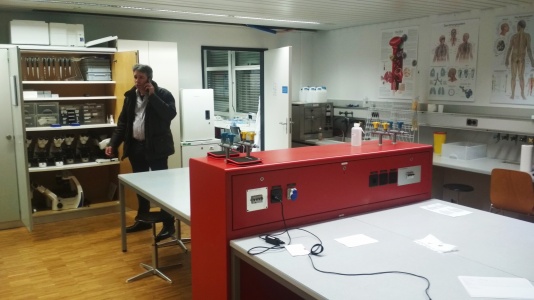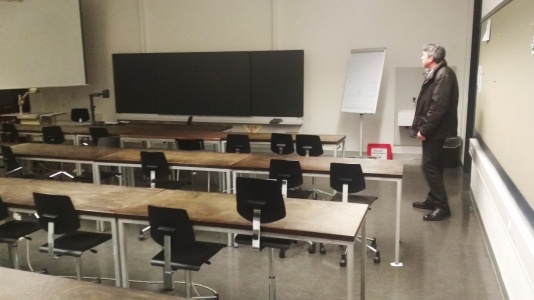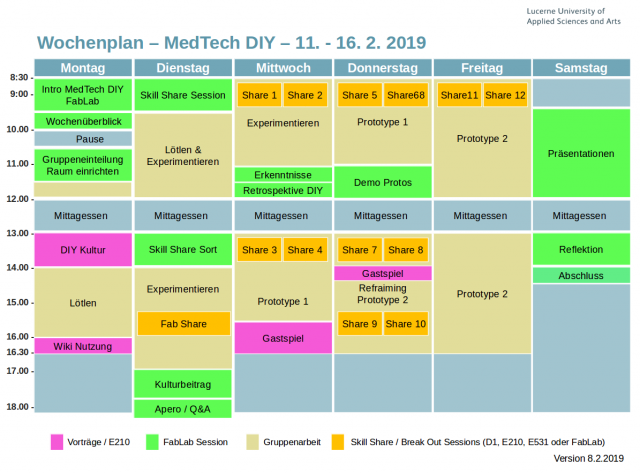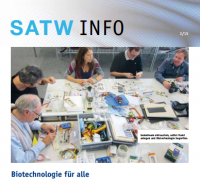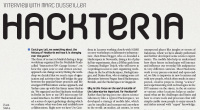Medizintechnik DIY 2019
Contents
- 1 Kurzbeschreib
- 2 Location(s)
- 3 Schedule
- 4 Kurzbeschreib
- 5 Skill Share Sessions
- 5.1 DIY-MedTech Fisch ausnehmen - Team Gustav
- 5.2 DIY-MedTech Rätoromanisch Grundkurs - Team Han Solo
- 5.3 DIY-MedTech - Günstig Reisen mit dusjagr
- 5.4 DIY-MedTech LaTex - Team Bärenbrüder
- 5.5 DIY-MedTech Dronen fliegen - Team Dagobert
- 5.6 DIY-MedTech Löten - Team Alligators
- 5.7 DIY-MedTech Bildgebende Verfahren
- 5.8 DIY-MedTech Destillieren - Team Enterprise
- 5.9 DIY-MedTech Human-Computer-Interfaces - gaudi
- 5.10 DIY-MedTech Ski wachsen - Team Fanta 4
- 6 Student Teams
- 7 Testat
- 8 Mentors
- 9 Pflichtlektüre & Videos / Compulsary Readings
- 10 How to use this wiki
- 11 Resources
- 12 Sharing Playground
- 13 Links
Kurzbeschreib
Das Modul verbindet Anwendungen der Medizintechnik mit Do It Yourself (DIY) Ansätzen. Dadurch wird das tiefere Verständnis von Medizintechnischen Geräten durch einen direkten, interdisziplinären und möglichst selbstgesteuerten Zugang gefördert. Basierend auf verschiedenen elektrophysiologischen Messmodulen (EMG, EKG, EOG, EEG) entwickeln die Studierenden im Team Ideen für innovative Projekte. Erste Prototypen werden mit den Mitteln der Digitalen Fabrikation hergestellt und getestet.
Location(s)
FabLab Horw (Trakt I)
Unterrichtsraum E210 (Trakt II) (40 Plätze)
Medtech Labor E531
Sitzungszimmer D1 (Trakt I) (ausgenommen Mittwochmorgen bis 12 Uhr)
Schedule
Montag, 11. Februar - Samstag 16. Februar 2019
Täglich von 8:30 - 12.00 and 13.00 - 16:30 Uhr
Samstag 09:00 - 14:00 Uhr
Schlusspräsentationen / Demos Zeitplan
- 8:30 Fablab is ab 8:30 offen falls ihr noch letzte Vorbereitungen machen wollt.
Die Präsentationen finden OBEN statt. Wir werden eine kleine Demobühne mit Tisch bereitstellen, den ihr brauchen könnt.
Es hat Lautsprecher, Beamer, Strom. Schaut ob ihr für eure Demo etwas umstellen müsst oder zusätzliche Technik benötigt.
Am besten bereitet ihr eure Demos/Protoypen gut vor und haltet sie bereit zum aufstellen. Die ersten 4 Teams sollten alles schon oben haben. Während der Pause können die anderen 4 Teams ihre eigenen noch bereitstellen. Es sollte kein grosses Geläufe mehr geben zwischen den einzelnen Präsentationen. Dazu ist die Pause da.
Infos zu dem Format der Präsentationen
Dauer pro Team, 15 Minuten, inkl 1-2 Minuten Fragen und Feedback der Studierenden.
Gestaltet den Tag unterhaltsam und authentisch, dH euer "Publikum" sind die anderen Studierenden. Gerne wollen sie erfahren was ihr gemacht habt, was euch inspiriert und auf die Ideen für eure Prototypen gebracht hat. Stellt euch und euer Team vor. Reflektiert über den Prozess wie ihr gemeinsam gearbeitet habt. Sprecht über offene Fragen / Probleme und wie ihr weitermachen würdet.
Schaut dass ihr die knappen 15 Minuten mit Filmen, guten Photos und Demos vielfältig gestaltet. Generell ist es unterhaltsamer, wenn verschiedene Leute aus dem Team unterschiedliche Phasen der Präsentation übernehmen , aber die Aufteilung müsst ihr selbst im Team abmachen. Sprecht euch gut ab, damit der Fluss / rote Faden übereinstimmt.
Zeitablauf Samstag 16. Feb
Opening
- 9.00 Willkommen und Besprechung Ablauf
Präsentationen / Demos
- 9:15 Team B: Bären
- 9:30 Team G: GUSTAV
- 9:45 Team C: Champs
- 10:00 Team F: Fanta 4
15 min Pause
- 10:30 Team A: Alligator
- 10:45 Team H: Han Solo
- 11:00 Team E: Enterprise
- 11:15 Team D: Dagobert
30 min Pause
- 12:00 Reflektion / Feeback Runde
- 12:30 Abschluss
- 12:45 Aufräumen
- 13:00 Good-bye
Content
Part 1: Introduction
- Introduction into DIY and Fablab
- Introduction of Winterschool
- Wiki-Intro
Part 2:
- Lötle
- Experimentiere
Part3:
- Skill Share Sessions - See more on BreakOut Methoden
- Input Lectures on DIY, MedTech and Hacklabs
Part4:
- Prototyping
- Experimenting
- Refraining
- more Prototyping
Part 5:
- Documentation
- Presentation
Post Production:
- Final Documentation
Input Lectures
See more about the Input Lectures on DIY, MedTech and Hacklabs
Emma Souharce & Daniel Siemaszko (Life Performance) | Dienstag 17:00
Geneva-based artist Emma Souharce began her work in the sound field during her master studies in radio projects such as Radiation24 and LapTop Radio, a project led since 2012 by Laurent Schmidt, Ceel Mogami de Haas and Jonathan Frigeri. Through her sound pieces, she develops a research related to the effect of frequencies on cerebral perception as well as the effect of the composition on the unconscious emotions and perception of time. It thus aspires to reach hypnopompes or hypnagogic states, at the limit between awakening and sleep, where thoughts are arranged by colliding.
Daniel....
Effi Tanner | Mittwoch 13.00
Greg Gage - Backyard Brains (VideoConf) | Donnerstag 14:00
Please prepare and give us a few specific questions about our experiences with the Backyard Brains tools / experiments / website. Propose improvements or future experiments that you would like to contribute.
Q & A with Greg - Backyard Brains 2019
Kurzbeschreib
Das Modul verbindet Anwendungen der Medizintechnik mit Do It Yourself (DIY) Ansätzen. Dadurch wird das tiefere Verständnis von Medizintechnischen Geräten durch einen direkten, interdisziplinären und möglichst selbstgesteuerten Zugang gefördert. Basierend auf verschiedenen elektrophysiologischen Messmodulen (EMG, EKG, EOG, EEG) entwickeln die Studierenden im Team Ideen für innovative Projekte. Erste Prototypen werden mit den Mitteln der Digitalen Fabrikation hergestellt und getestet.
Was ist eine Skill Share Session?
Wird im Rahmen der Einleitung im Detail erklärt. Hier ein paar Beispiele vom Kurs im Winter 2018.
http://www.hackteria.org/wiki/BreakOut_Methoden
DIY-MedTech Fisch ausnehmen - Team Gustav
Mittwoch 10:15, FabLab - Draussen
DIY-MedTech Rätoromanisch Grundkurs - Team Han Solo
Mittwoch 13:30, E210
DIY-MedTech - Günstig Reisen mit dusjagr
Donnerstag 8:45, Sitzungszimmer D1
DIY-MedTech LaTex - Team Bärenbrüder
Donnerstag 08:45, E210
DIY-MedTech Dronen fliegen - Team Dagobert
Donnerstag 13:00, E210
DIY-MedTech Löten - Team Alligators
Donnerstag 13:00, E210
DIY-MedTech Bildgebende Verfahren
Donnerstag 13:15, FabLab Cafe
DIY-MedTech Destillieren - Team Enterprise
Donnerstag 15:30, Medtech-Labor E530
DIY-MedTech Human-Computer-Interfaces - gaudi
Donnerstag 15:30 Uhr, FabLab Cafe
DIY-MedTech Ski wachsen - Team Fanta 4
Freitag 08:45 Uhr, FabLab
Student Teams
Alligators
Bärenbrüder
Team Champs
Team Dagobert
Team Enterprise
Team Fanta 4
Team GUSTAV
Team Han Solo
Team Mentorzzzz
Testat
Teilnahme
- Pflichtlektüren gelesen
- Aktive Teilnahme an allen Tagen der Blockwoche
Leistungsnachweis
Wiki-Seite pro Gruppe (70%) mit:
- Reflektion zu Readings / Input Vorlesungen
- Dokumentation der Experimente während der Woche
(Experimente, Resultate, Erkenntnisse, Links/Resourcen, Bilder)
- Dokumentation des Skill-Share Session
(Vorbereitung, Durchführung, Erfahrungen, Links, Resourcen)
Schlusspräsentation in der Gruppe am Samstag (30%)
Abgabetermin Wiki-Seiten: Sonntag 10. März, 24:00
Mentors
Urs Gaudenz aka Gaudi
Urs Gaudenz is an engineer and interdisciplinary scholar working in Lucerne, Switzerland. He was born 1971 in Seattle USA. He got his master in science of Microtechnologoy from the Swiss Federal Institute of Technology, Lausanne. Subsequent to that he attended Post-Graduate programs in international business and innovation-management. In 2016 completed the course of study in the Principles and Applications of Synthetic Biology as directed by Georg Curch, Professor of Genetics at Hardward Medical School. He is founder of GaudiLabs, a third space for third culture. He is a founding member and member of the board of Hackteria International Society. He is currently on the faculty of the Lucerne School for Applied Science and Arts. In his professional practice, Urs Gaudenz makes use of various forms of work and expression such as prototype development, open scientific research and collaborative workshops. He is combining his different backgrounds to explore new technological and cultural fields and his works often emerges out of the void in this intersection. Remarkable in his work is the wide span from speculative and futuristic to very functional and applied. He worked with and was inspired by Dr. Marc Dusseiller - dusjagr labs, the Swiss Mechatronic Art Society, the GynePunk, BioDesign for the Real World, Sci | Art NanoLab Summer Institute at UCLA, LifePatch. He was invited to give workshops or exhibit projects at renown institutions and festivals such as Ars Electronica - Projekt Genesis, ISEA - International Symposium on Electronic Art, DOCK18, space for media cultures of the world, Kapelica Gallery / BioTehna, Schloss Werdenberg, N/O/D/E festival, Medialab-Prado Madrid, CYNETART-Festival - Trans-Media-Akademie.
http://www.gaudi.ch/GaudiLabs/
Dr. Marc R. Dusseiller aka dusjagr
Marc Dusseiller aka dusjagr is a nomadic researcher and workshopologist. He is part of the Center for Alternative Coconut Research and co-founder of SGMK and the Hackteria network. He loves making DIWO laboratories for creative biological experimentation and works in an integral way, combining science, art and education. He has worked as guest faculty and mentor at various schools, Srishti Institute of Art, Design and Technology, Bangalore (IN), UCSB (USA) and in Switzerland, FHNW, HEAD, ETHZ. He lives and works in Zürich, Yogyakarta and Taipei. He also loves coconuts.
See more about dusjagr and full biography
Effi Tanner
Effi Tanner (*1982) ist Medienkünstlerin und Kulturvermittlerin. Sie arbeitet als Medienkunstentwicklerin bei der Rocket Science GmbH und führt daneben den Work-Shop-Space Dymax.iøn in Zürich, eine Plattform für lokale Künstler, Designer und andere Macher. Seit 2008 ist sie Vorstandsmitglied der Schweizerischen Gesellschaft für Mechatronische Kunst SGMK, von 2012 bis 2015 war sie Präsidentin des Vereins.
Chris Obrist
Chris ist seit 2015 Fabmanager im FabLab Luzern.
Nach eine Ausbildung zum Werbefachmann hat er den Bachelor in Kunst und Vermittlung der Hochschule Luzern, Design & Kunst gemacht. Als Kunstler hatte er bereit verschiedene Ausstellungen und Live-Performances.
Pflichtlektüre & Videos / Compulsary Readings
Open Culture did not start with the invention of the computer
Open Culture is a concept according to which knowledge should be spread freely and its growth should come from developing, altering or enriching already existing works on the basis of sharing and collaboration, without being restricted by rules linked to the legal protection of intellectual property. In a context of globalization, the consequence is that all citizens should have equal access to information.
FabLab
Fab Charta
http://fablab-luzern.ch/info/fab-charta-2/#FabCharter
Articles
Biotechnology for All / DIY in bioanalytics: doing and grasping it yourself. SATW publication 2015
SATW Info 2/15 – Biotechnology for all / DIY in bioanalytics: doing and grasping it yourself.
«Do it yourself» in der Bioanalytik – zum Download auf Deutsch
"Biotechnologische Forschung findet heute nicht mehr nur in spezialisierten Labors statt. Eine wachsende Gemeinschaft von Biologen, Bastlern und Technikbegeisterten experimentiert in Küchen, Werkstätten und Eigenbau-Labors. Einige sehen in der Demokratisierung der Biotechnologie eine Gefahr; andere die Chance für ein besseres Verständnis von komplexen wissenschaftlichen Zusammenhängen in der Gesellschaft."
The article from SATW Info 2/15 – Biotechnology for all / DIY in bioanalytics: doing and grasping it yourself is available for download in German, English and French. The pedagogic conecpt and educational kits were developed during a project funded by the Swiss Academy for Engineering Sciences (SATW), together with hackteria, M. Dusseiller and U. Gaudenz, and FHNW School for Lifesciences, Dr. D. Gygax, during a workshop with an interdisciplinary group of participants. More info here.
Interview in "The Art of Free and Open Science", MCD#68
Mehr zum Artikel und Interview in MCD#68
Interview zum Download in Englisch
Hackteria is a network of people practicing DIY (do-it-yourself) biology with an interest in art, design and interdisciplinary cooperation. The network was founded in 2009 by Yashas Shetty, Andy Gracie and Marc Dusseiller and now includes not only scientists, engineers and artists, as you would expect, but also philosophers, entrepreneurs, and even foodies and chefs. Hackteria operates on a global scale, and is based on a web platform and a wiki for sharing knowledge, which enable anyone to learn but also test different ways of hacking living systems. Hackteria is not based in a physical space, and its goal is to allow artists, scientists and hackers to collaborate and test various biohacking and bioart techniques outside the official laboratories and art institutions, basically anywhere in the world.
Videos
How to control someone else's arm with your brain | Greg Gage
As grad students at the University of Michigan, co-founders Tim and Greg often interacted with schoolchildren during neuroscience outreach events. We often wanted to show real "spiking" activity to students, but this was impossible due to the high cost of equipment. By using off-the-shelf electronics, we designed kits that could provide insight into the inner workings of the nervous system.
Go and look at their website! Backyard Brains - Neuroscience For Everyone!
P2P and Utopia | Based on Poem by Vasilis Kostakis 2008
FLOSS and Wikipedia are only some examples of the P2P movement that is building the world it wants within the confines of the fragmented world it wants to transcend.
More on The Commons Transition Primer
"Simplicity: We know it when we see it" | George Whitesides
Simplicity: We know it when we see it -- but what is it, exactly? In this funny, philosophical talk, George Whitesides chisels out an answer.
More about Simplicity, in the specific case of "A lab the size of a postage stamp"
"Why toys make good medical devices | Jose Gomez-Marquez
We develop empowerment technologies for health. We believe that innovation and design happens at the frontline of healthcare where providers and patients can invent everyday technologies to improve outcomes. By radically democratizing the tools of medical creation, we seek to enable front line patients and providers to invent answers to disease burdens.
SENI GOTONG ROYONG: HackteriaLab 2014 - Yogyakarta
HackteriaLab 2014 – Yogyakakarta is a two-weeks making-oriented gathering of researchers, artists, scientists, academicians, hackers and whatevers in Yogyakarta. It was hosted by LIFEPATCH - citizen initiative in art, science and technology and co-organized together with HACKTERIA | Open Source Biological Art in collaboration with various regional partners. As a web and community platform, Hackteria tries to encourage scientists, hackers and artists to collaborate and combine their expertise, write critical and theoretical reflections, share simple instructions to work with life science technologies and cooperate on the organization of workshops, festival and meetings.
See the full 50' film HLab14-Documentary to learn more about such collaborative and transdisciplinary co-production laboratories
Open Source Estrogen: Housewives Making Drugs - Mary Maggic
How to use this wiki
Dear participants, please make sure you prepare your account and get some first experience in using a wiki, in this case it's MediaWiki the same software on which the famous wikipedia has been created. The previous link directs you to many instructions on how to use a wiki. look at it.
You should have received a login by now. Try it out and create a new page for your own project notes, give it a reasonable name and make sure you add the folling line at the end of the page, so it will be sorted all in the same category.
[[ Category:MedTech-DIY ]]
Please write a few sentences about yourself, add links to your other websites, blogs, biographies, artworks.
- try to add images
- "internal links" to other pages on the hackteria wiki
- "external likns" to websites
- embed a youtube video?
You can always click the "edit" link on this or other pages to see how stuff has been written in the mediawiki language.
Resources
http://www.hackteria.org/wiki/BreakOut_Methoden
http://finding-marbles.com/retr-o-mat/was-ist-eine-agile-retrospektive/
Related to the core of this course
Backyard Brains - Neuroscience For Everyone!
https://backyardbrains.com/
Backyard Brains - Muscle SpikerShield
Maschinen, Elektronik und Prozesse steuern über die elektrische Aktivität deiner Muskeln
https://backyardbrains.com/products/muscleSpikerShield
DIY Version
https://backyardbrains.com/products/diyMuscleSpikerShield
Heart and Brain SpikerShield Bundle
Mit dem Brain SpikerShield kannst Du actions Potentiale deines Herzen und Hirn (EEG/EKG) visualisieren und aufnehmen.
https://backyardbrains.com/products/heartAndBrainSpikerShieldBundle
Backyard Brains - Experimente
https://backyardbrains.com/experiments/
The Biosignals How-To
https://biosignals.berndporr.me.uk/doku.php
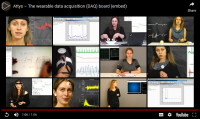
Experiments by dusjagr measuring electro-active fish
Fish-Hacking
TED Talk - Steuern der Muskeln einer anderen Person über dein Gehirn
https://www.youtube.com/watch?v=rSQNi5sAwuc&feature=youtu.be
TED Talk - Elektrische Experimente mit Pflanzen
https://www.ted.com/talks/greg_gage_electrical_experiments_with_plants_that_count_and_communicate?language=en
Elektroenzephalografie EEG - Messung der elektrischen Aktivität des Gehirns
https://de.wikipedia.org/wiki/Elektroenzephalografie
Elektrokardiogramm - Aufzeichung der elektrischen Aktivität aller Herzmuskeln
https://de.wikipedia.org/wiki/Elektrokardiogramm
Elektrookulografie - Messung der Bewegung der Augen und der Veränderung des Ruhepotentials der Netzhaut
https://de.wikipedia.org/wiki/Elektrookulografie
Arduino
Arduino - Open Source Elektronik Platform mit einfach zu bediender Hard und Software
https://www.arduino.cc/
TED Talk - Was ist ein Arduino mit Massimo Banzi
https://www.youtube.com/watch?v=UoBUXOOdLXY
Arduino UNO Board
https://store.arduino.cc/arduino-uno-rev3
Arduino Einführung
https://www.youtube.com/watch?v=0wAY3DYihyg&list=PLAB63281B90FB376E
http://www.tamberg.org/chopen/2017/LoRaWANIoTWorkshop.pdf p.10-38
Tools
Inkscape – vector graphics editor
https://inkscape.org/en/
GIMP - GNU Image Manipulation Program
http://www.gimp.org/
TinkerCad - create and print 3D models
https://www.tinkercad.com/
Blender, open source 3D creation suite
https://www.blender.org/
123D family, Autodesk suit of tools
http://www.123dapp.com/
SolidWorks – comercial 3D CAD software,
available in FabLab Lucern
3D Reconstruction / Photomodeling
https://alicevision.github.io/
Hacks
Earthworms Neuroscience
https://www.researchgate.net/publication/260446606_Portable_conduction_velocity_experiments_using_earthworms_for_the_college_and_high_school_neuroscience_teaching_laboratory/figures?lo=1
https://www.researchgate.net/publication/320892253_Grasshopper_DCMD_An_Undergraduate_Electrophysiology_Lab_for_Investigating_Single-Unit_Responses_to_Behaviorally-Relevant_Stimuli
Syringe Hack
https://www.youtube.com/watch?v=LSiyyxohsXk&feature=youtu.be&fbclid=IwAR28CnNglvWF4aG0yXoCvOzyqTV6aBpwrtv9BU2EQ-q-3wwL_Aif9GZ5tcM
Open Source Culture / Commons Transition / P2P
What is a Commons Transition?
‘Commons Transition’ describes proposals for action that prioritize civil society’s needs, towards a more democratic and environmentally conscious culture. Constant economic growth produces negative impacts and the capture (enclosure) of scarce physical resources for private financial gain while abundant resources, such as information and culture, are made artificially scarce through legal limitations. A Commons Transition recommends P2P practices and networks for sharing what’s abundant, and protecting what’s scarce. Peer decision-making at many scales, and the emergence of municipalist political movements, are part of this transition.
https://primer.commonstransition.org/1-short-articles/1-1-what-is-a-commons-transition
The open source way
The open source way is about applying the principles of open source software development beyond software. Beyond technology. Opensource.com is about sharing how the open source way can change our world in the same way the open source model has changed software.
Open exchange
We can learn more from each other when information is open. A free exchange of ideas is critical to creating an environment where people are allowed to learn and use existing information toward creating new ideas.
Participation
When we are free to collaborate, we create. We can solve problems that no one person may be able to solve on their own.
Rapid prototyping
Rapid prototypes can lead to rapid failures, but that leads to better solutions found faster. When you're free to experiment, you can look at problems in new ways and look for answers in new places. You can learn by doing.
Meritocracy
In a meritocracy, the best ideas win. In a meritocracy, everyone has access to the same information. Successful work determines which projects rise and gather effort from the community.
Community
Communities are formed around a common purpose. They bring together diverse ideas and share work. Together, a global community can create beyond the capabilities of any one individual. It multiplies effort and shares the work. Together, we can do more.
Einführung auf Wikipedie "Offene Kultur" DE
https://de.wikipedia.org/wiki/Open_Culture
Free Hardware and Free Hardware Designs, Richard Stallman
https://www.gnu.org/philosophy/free-hardware-designs.html
What is Open Source explained in LEGO
Löt(l)en
Soldering is easy
https://mightyohm.com/files/soldercomic/FullSolderComic_EN.pdf
Fablabs, Hackerspaces and Universities
FabLab Luzern
http://fablab-luzern.ch/
Maschinen Anleitungen für das FabLab Luzen
Swiss FabLabs and global Networks
https://fablab.ch/#/news
Global FabFoundation - facilitate and support the growth of the international fab lab network
http://fabfoundation.org/
FabAcademy - Learn to Turn Codes into Things
http://fabacademy.org/
Hackerspaces - Was ist ein Hackerspace
https://de.wikipedia.org/wiki/Hackerspace
List of ALL Hacker Spaces
https://wiki.hackerspaces.org/List_of_ALL_Hacker_Spaces
Hackuarium - Open Biohacker Space in Lausanne (Renens)
http://www.hackuarium.ch/en/
Hackathon - a Hacking Marathon
https://de.wikipedia.org/wiki/Hackathon
HACKLABS AND HACKERSPACES – TRACING TWO GENEALOGIES
http://peerproduction.net/issues/issue-2/peer-reviewed-papers/hacklabs-and-hackerspaces/
Hackteria, Temporary Labs
Hackteria - Globales Netzwerk und Webplaform für Open Source Biological Art, DIY Biology, Generic Lab Equipement
Marc Dusseiller: HACKTERIA - OPEN SOURCE BIOLOGICAL ART
https://www.youtube.com/watch?v=hEggLeGLzW4
HackteriaLab 2014 Yogyakarta
https://www.youtube.com/watch?v=_CqTzpS7yl8
GaudiLabs - GaudiLabs are creative spaces for open research in open source culture technology.
http://www.gaudi.ch/GaudiLabs/
LabMaking - Aufbau eines Labors
https://www.hackteria.org/wiki/Bio_Lab_Infrastructure
LabMaking - Eine Anleitung von Sachiko Hirosue & Urs Gaudenz
http://wlu18www30.webland.ch/wiki/images/9/91/LabMaking_HLab14book.pdf
Sharing Playground
Sense of Self - by TeZ aka Mauricio Martinucci
Some documentation of course materials for Sense of Self
Photo Album on recent Biometrics by TeZ
“If music isn’t entertainment, what is it?” - by Onyx Ashanti
Onyx Ashanti is a Detroit-based Afrofuturist living in a basement with only an extension cord from a nearby unit. When he's not traveling the world having sonic conversations about evolution and technology, he's using a homemade 3D printer made from recycled electronics to work on wearable kinetic modular digital synthesizers. The implicit story of music on earth is that of a shared destiny, a deeply-felt common bond that transcends space, time, and tribe, and helps to define us as a species. Onyx works in evolving rituals, from the ancient to the contemporary, forging new paths and passing down timeless practices.
Heartbeat controlled acoustic levitation synthesizer
Pictures of Gaudi's Heartbeat Controlled Acoustic Levitation Synthesizer
Wearable LoRaWAN Muscle SpikerShield
How to build a Wearable LoRaWAN Muscle SpikerShield
KresseShield
Backyard Brains Fablab Luzern KresseShield
Github for KresseShields: https://github.com/GenericLab/KresseShield
DIY MedTech WishList
Put down ideas on DIY MedTech WishList for future editions of this course. What else would we need? Materials, devicees, infrastructure, people?
Links
Earlier Editions MedTech DIY
Medizintechnik_DIY_2019
Related Courses
NanoHacking - Interdisciplinary Course at University of Lichtenstein
"The innovators of 1600 were hackers before the word existed; they proposed open sharing of ideas for the benefit of humanity. Isaac Newton, Robert Hooke, Descartes, and the other scientists of the late 1600s could not have inaugurated the greatest scientific innovation of all time—the invention of modern science itself—without the Hackers of the 1600s. The Renaissance’s secretive structure was hacked, and it inspired the Scientific Revolution."
From DIY lab tools to field-works
LabHacking - From DIY lab tools to field-works, UCSB
The Art of BioHacking
The Art of BioHacking or How to make Cheese and Wine, HEAD, Geneva
DIWO Culture
HaSTA DIWO Culture : Hacking art/Sci/Tech & Activism
To engage with the most pressing issues (environment, social injustice, globalisation) of society, artist have embraced new transdisciplinary practices, which combine the use of open source tools (OST) and hacking strategies in a collaborative manner with "others". DIWO (Do It With Others) Culture will introduce such strategies through case studies, hands-on experimentation and team projects to the students. This first edition will focus on OST for environmental monitoring and artistic interpretation.
HSLU Related Institutes
Medizintechnik - Experten an der Schnittstelle von Technik und Medizin
https://www.hslu.ch/de-ch/technik-architektur/institute/medizintechnik/
Innovation und Technologiemanagement - Gemeinsam überzeugt die Zukunft gestalten
https://www.hslu.ch/de-ch/technik-architektur/institute/innovation-und-technologiemanagement/
Maschinen- und Energietechnik - Innovationstreiberin an der Schnittstelle der Ingenieursdisziplinen
https://www.hslu.ch/de-ch/technik-architektur/institute/maschinen-und-energietechnik/
Zukunftslabor CreaLab - Erforscht Möglichkeitsräume, die kreatives Denken und Handeln fördern
https://blog.hslu.ch/crealab/
